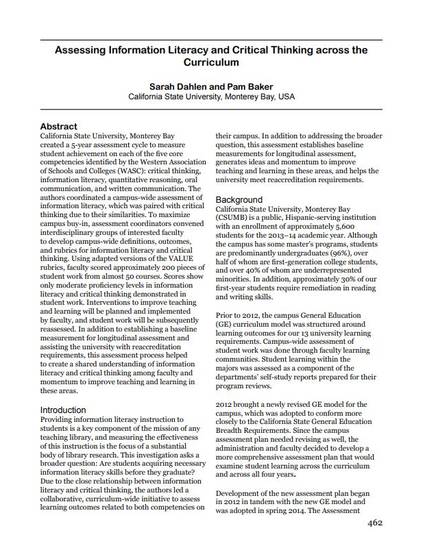
Article
Assessing Information Literacy and Critical Thinking across the Curriculum
Proceedings of the 2014 Library Assessment Conference: Building effective, sustainable, practical assessment
(2015)
Abstract
California State University, Monterey Bay created a 5-year assessment cycle to measure student achievement on each of the five core competencies identified by the Western Association of Schools and Colleges (WASC): critical thinking, information literacy, quantitative reasoning, oral communication, and written communication. The authors coordinated a campus-wide assessment of information literacy, which was paired with critical thinking due to their similarities. To maximize campus buy-in, assessment coordinators convened interdisciplinary groups of interested faculty to develop campus-wide definitions, outcomes, and rubrics for information literacy and critical thinking. Using adapted versions of the VALUE rubrics, faculty scored approximately 200 pieces of student work from almost 50 courses. Scores show only moderate proficiency levels in information literacy and critical thinking demonstrated in student work. Interventions to improve teaching and learning will be planned and implemented by faculty, and student work will be subsequently reassessed. In addition to establishing a baseline measurement for longitudinal assessment and assisting the university with reaccreditation requirements, this assessment process helped to create a shared understanding of information literacy and critical thinking among faculty and momentum to improve teaching and learning in these areas.
Disciplines
Publication Date
2015
Citation Information
Dahlen, S., & Baker, P. (2015). Assessing information literacy and critical thinking across the curriculum. In S. Durso, S. Hiller, M. Kyrillidou, & A. Pappalardo (Eds.), Proceedings of the 2014 Library Assessment Conference: Building effective, sustainable, practical assessment (pp. 462-469). Washington, DC: Association of Research Libraries.
